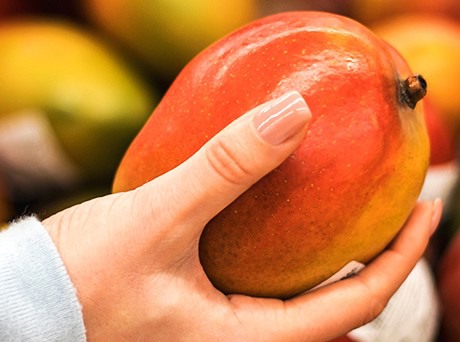The REWE Group is the first trader in Germany to test the "Coating". Their fruit is given a thin edible coating that reduces cellular respiration and keeps the fruit fresh for longer. To look good, stay fresh and taste good: food technologists have long been tinkering with how to improve the shelf life, texture and taste of fruits and vegetables - to curb spoilage, but also to save on packaging material. The most recent idea is called Coating. Fruit and crops are given a wafer-thin, edible coating that reduces cellular respiration. This means the fruits stay fresh longer.

At least, these are the elements promised by the manufacturer. Initial tests in the US and UK show that the Coating could actually be a suitable means of delaying ripening and reducing spoilage. According to a recent study by the UN, 14 percent of all food worldwide is "lost" during production. Reasons include errors in harvesting, transport and storage.
Curbing losses & food waste
The REWE Group is the first grocery retailer in Germany to test whether -and if so ,to what extent- coating can help to reduce losses and food wastage. "We've been betting on food waste and saving plastic packaging for years, and we want to see how it works in practice," explains Eugenio Guidoccio, Executive Director Ultra Fresh - Fruit and Vegetables. In the next few weeks, the REWE Group will treat tropical fruits accordingly. Limes, avocados, mangos and pomelos get a thin coating of natural sugar, cellulose and vegetable oils. "The coating is edible and well tolerated," promises the British manufacturer AgriCoat NatureSeal.
"We want to observe how the fruits undergo the transport to our warehouses and how they will keep during their stay there. Our hope is that they stay fresh for much longer," explains Guidoccio. The first test products are already in the warehouses. "Depending on how the tests go, we will decide to extend the test to selected REWE and PENNY stores, if necessary, and to possibly add additional items."
The REWE Group is open to innovative technologies and has been observing the subject of coating very closely for two or three years. In the US, this procedure was first tested and applied. Since the EU gave the go-ahead for coating a few months ago, the REWE Group is pushing ahead with the topic.
Staying "harvest fresh" for weeks
Nearly 100 years ago, people resorted to a simple means to make fruits more durable: they covered fruit with wax. Today, companies such as the British AgriCoat NatureSeal, a subsidiary of the US group Mantrose Haeuser, rely on a thin and taste-neutral coating called "Semperfresh".
It consists of a mix of natural sugar residues, cellulose and vegetable oils and can be applied by spraying or dipping the fruit. The 'film', thus applied, reduces the cellular respiration of the fruits. The coatings are designed to "let through" more carbon dioxide than oxygen. This creates a kind of modified atmosphere in the fruits. According to AgriCoat NatureSeal, it delays the ripeness and reduces the spoilage of many fresh fruits. They remained "harvest fresh" twice as long as untreated fruit.

